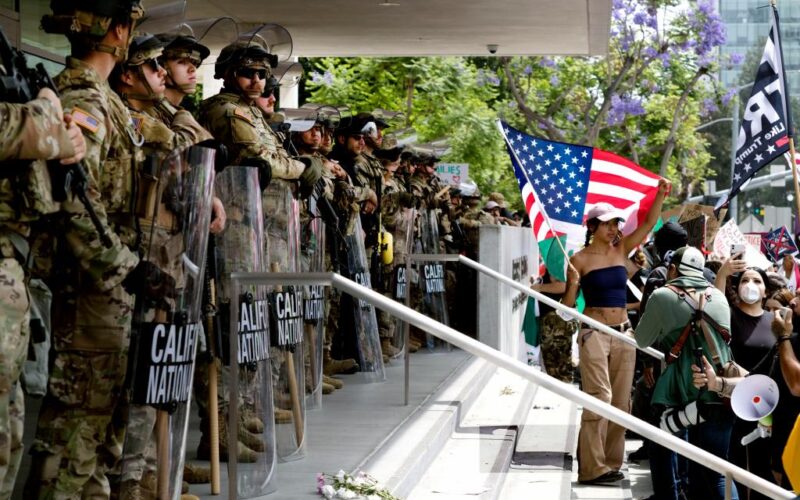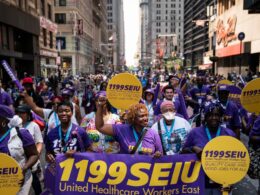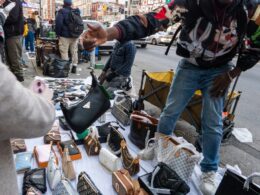Donald Trump believes sending the National Guard into majority-Black cities will benefit him. It may cost him — and Democrats should do everything in their power to make him pay.
Trump’s administration said it will deploy the National Guard in Chicago and Memphis after doing so in Los Angeles and Washington, D.C., with threats of mobilizing the guard in cities nationwide, including his home city of New York.
Like guard deployments throughout harrowing times in U.S. history, Trump is sending troops to cities with large Black populations. Trump’s justification is crime control. But Democrats and others disagree, noting that violent crime is down in most major cities.
For instance, a recent poll found that most Americans believe troop deployments are more about politics than fighting crime. When considering race, the Black community is far more likely than other racial groups to reject deployments on principle: 84% oppose them, compared with 66% of Latinos and 49% of whites.
This data shows that Black voters reject the deployment of troops in their neighborhoods. A review of history explains why.
In 1917, the East St. Louis Race Riots erupted after tens of thousands of Black migrants moved to the city seeking work. White mobs killed hundreds. The National Guard was called in to restore order, but reports show troops stood by idly or joined the rampaging mobs.
Orval Faubus, Arkansas’ former governor, who opposed desegregation, employed troops in 1957 to block nine Black students from entering Little Rock Central High School. Wielding those troops, Faubus didn’t care about upholding the law or the well-being of those children, the youngest being only 14.
In the 1960s, the National Guard was mobilized to major cities like Los Angeles (Watts), Newark and Detroit in response to civil unrest, the root causes of which were untenable conditions in the Black community: police brutality, lingering discrimination, and poverty.
Riots broke out in Los Angeles in 1992 after LAPD officers were acquitted on charges of beating a Black motorist. The Guard, Marines, and Army were dispatched. Because the troops were not fully trained for urban riot control, it led to confusion and inconsistent law enforcement.
Our work at Black Insights Research confirms that this bitter history shapes today’s politics. In the aftermath of the 2024 election, our data indicates that 71% of Black people would feel threatened if Trump deployed troops on American soil.
Our research also suggests that Black people who perceive Trump’s deployment of the military as a threat were also more likely to vote in the 2024 presidential election. They are also more likely to vote in statewide elections in their respective states. This is especially the case for low-propensity voters, whose likelihood of participating changes the most depending on their perceived level of military threat; after accounting for various other factors, threat increases the probability that a low-propensity Black voter actually turns out by 8%.
After Black turnout declined in 2024 Democrats must get those who may not vote regularly back to the polls if they have any hopes of reclaiming the House or the Senate in 2026, and the White House in 2028. Trump’s deployments give them that chance.
Looking back, our research has shown how the mobilization of low-propensity Black voters may have shifted the election in favor of Kamala Harris had her campaign sought to mobilize this group. Looking ahead, the Democratic Party can harness the untapped potential among low-propensity Black voters in the upcoming midterms and beyond.
Since these deployments are likely to be extended elsewhere, impacting Black communities, it’s time for Democrats to do more than complain about Trump’s motives for the mobilization.
Trump’s actions aren’t just political theater. They’re a direct assault on Black communities and a catalyst for mobilization. Democrats must confront the threat directly and build a strategy that puts Black voters, and their concerns, at the center of the fight.
Trump is handing Democrats an opportunity. They need to take advantage of it. Their political survival may well depend on it.
Parker, a professor of political science at the University of California at Santa Barbara, and Towler, an associate professor of political science at California State University at Sacramento and the director of the Black Voter Project, lead Black Insight Research, a research firm that specializes in seeking solutions to more equitable outcomes for the Black community.








